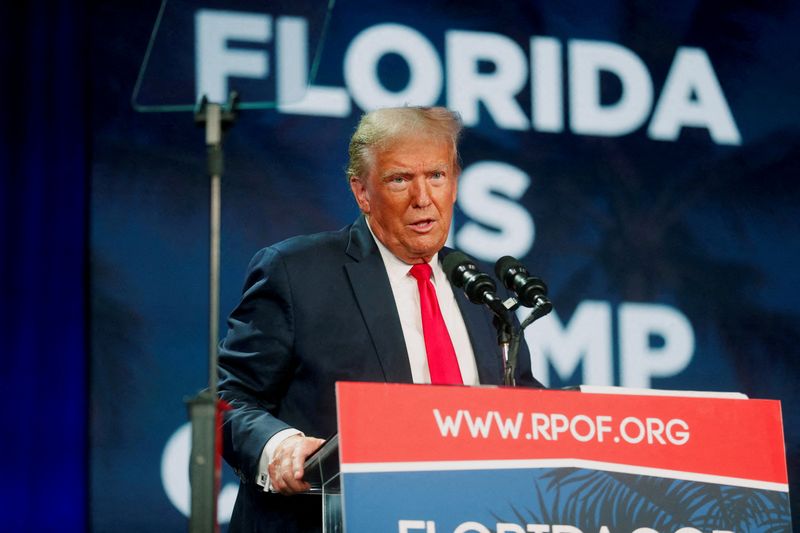Trump targets 2024 Hispanic vote as rivals gather for Miami debate
2023.11.08 06:56

© Reuters. Former U.S. President and Presidential Republican candidate Donald Trump speaks to his supporters during the Florida Freedom Summit held at the Gaylord Palms Resort & Convention Center in Kissimmee, Florida, U.S., November 4, 2023. REUTERS/Octavio Jones/
By Nathan Layne and James Oliphant
(Reuters) – Donald Trump, the frontrunner for the Republican presidential nomination, will stage a rally outside Miami on Wednesday to court Hispanic voters seen as important to 2024 electoral victory as his party rivals gather to debate again without him.
The rally in the Cuban American stronghold of Hialeah is aimed in part at boosting Trump’s support among Hispanics in Florida, campaign spokesman Steven Cheung said. Trump’s support among Hispanics, the fastest-growing ethnic and racial group in the U.S. electorate, swelled during his 2020 campaign.
The locations of both events – the debate will be a half-hour away in Miami-Dade County – underscore the potential for both Trump and his rivals with a demographic increasingly disillusioned by cultural and economic policies on the left.
“We picked up a lot of voters and they continue to trend our way,” said Christian Ziegler, chair the Republican Party of Florida, referring to 2020 and 2022. “That’s why you see both the debate and the rally location being announced there.”
Miami-Dade is Florida’s most populous county and home to 1.5 million Latinos of voting age. Democrat Hillary Clinton carried the county over Trump by nearly 30 percentage points in 2016. Trump cut that margin to 7 percentage points against Democrat Joe Biden in 2020.
Ron DeSantis won the county outright in his re-election campaign for governor in 2022, winning 65% of the Hispanic vote in a landslide victory that suggested a massive shift toward the Republicans in just six years.
Now Trump is banking on Hispanic voters to help him defeat DeSantis, who is a distant second in polls in the Republican nominating contest, while looking to lock in their support for a likely general election rematch with Biden in November 2024.
It is part of a broader attempt by Trump to expand a base built on white, rural voters. In addition to the party’s gains with the Hispanic community, opinion polls released this week by The New York Times and Siena College show that 22% of Black voters in six hotly-contested states support Trump, a level not secured by a Republican presidential candidate in modern times.
Democrats have fretted about the erosion of their advantage with Latino voters since the 2020 election when Trump pulled a larger share of that vote – 32% – than any Republican since President George W. Bush almost two decades ago.
REPUBLICAN OUTREACH
Republicans have been investing in community outreach programs in Florida and see potential for further gains.
Ziegler said his party has been able to connect with more Hispanic voters by focusing their communications on issues important to them, including a program expanding access to school vouchers signed into law by DeSantis earlier this year.
In a Reuters/Ipsos poll in September 38% of Hispanic respondents said they would vote for Biden, while 36% picked Trump. That would appear to be a troubling trend for Biden, who beat Trump by about 20 points among Hispanic voters in 2020, according to an analysis of exit poll data by Pew Research.
The Biden campaign isn’t sitting on its hands. It views Hispanic, Black and young voters as critical to its chances in 2024 and has started to ramp up spending on Spanish-language ads, among other measures targeting swing states.
But campaign advisers are also aware that Florida, which was once a battleground but is now solidly Republican, will be tough for Biden to capture, regardless of how he fares with Hispanic voters.
Trump’s legal troubles appear to be helping boost his standing with Hispanic voters, many of whom fled repressive regimes and sympathize with Trump’s unfounded claims that he is being prosecuted for political reasons.
“It’s a political persecution just like Venezuela and Nicaragua,’ said Fabio Andrade, a Colombian-American businessman who helps organize Hispanic voters as part of a “Republican Amigos” club. “No different.”








